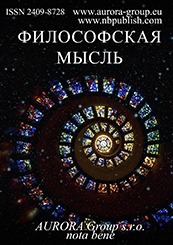Spectrum of consciousness
Reference:
Sergienko, A.Y., Gluhovskii, A.S. (2025). Animals in G. W. Leibniz's metaphysics: ontological status, gnosiological aspects and ethical perspectives in the optics of modern receptions. Philosophical Thought, 6, 1–24. https://doi.org/10.25136/2409-8728.2025.6.74388
Abstract:
The article examines the ontological and epistemological status of animals in the metaphysics of Gottfried Leibniz, contrasting its conclusions with the provisions of the dualistic system of René Descartes, who reduces animals to "physical automata". The problem of dualism, to which Leibniz's philosophy responds in this study, is formulated through the concept of the "anthropological machine" of the animal-human difference (D. Agamben). The main focus of the study is aimed at analyzing the concepts of "corporeal substances" and "tiny perceptions" in Leibniz's philosophy, revealing the specificity of animal consciousness as an intermediate link between inanimate matter and reflective reason. In the context of classical and modern interpretations of Leibniz's philosophy, the authors consider how a critical understanding of the Leibnizian system allows us to problematize the factor of anthropocentrism in metaphysics, recognizing animals as bearers of non-reflexive apperception and subjects of their own "surrounding worlds" (Umwelt). The study touches upon the conceptual connection of Leibniz's philosophy with the ethological theory of J. von Uexküll and posthumanist ethics, presenting the "animal monad" as a unique perspective on the universe. The work is based on the historical and philosophical analysis of the texts of Descartes and Leibniz, a comparative study of modern interpretations of their ideas, as well as a conceptual analysis of the concepts of Leibniz's philosophy within the framework of posthumanist philosophy. The novelty of the study lies in the consideration of Leibniz's theory of apperception as animal psychology, demonstrating that Leibniz's non-reflexive awareness of perceptions serves as the basis for recognizing animals as active agents of a metaphysical order. Based on Gilles Deleuze's interpretation, it is demonstrated that Leibniz's ideas about recursive "corporeal substances" allow us to conceptualize "animal monadology" and rethink instinctive behavior not as a reflex mechanism, but as an animal form of thinking that constructs special perceptual worlds. The conclusions of the article emphasize the significance of Leibnizian metaphysics for posthumanist optics, within which animal monads are recognized as active participants in the ontological continuum. The work contributes to the actualization of Leibniz's philosophy by rethinking the status of animals in his metaphysical teaching and bringing the philosopher's intuitions closer to contemporary problems of the ontological, epistemological and ethical aspects of the philosophy of animals.
Keywords:
Jakob von Uexküll, Gilles Deleuze, Gottfried Leibniz, Umwelt, anthropological machine, non-reflective apperception, posthumanist ethics, animal monadology, classical metaphysics, critical animal studies
 This work is licensed under a Creative Commons Attribution-NonCommercial 4.0 International License.
This work is licensed under a Creative Commons Attribution-NonCommercial 4.0 International License.










 © 1998 – 2025 Nota Bene. Publishing Technologies. NB-Media Ltd.
© 1998 – 2025 Nota Bene. Publishing Technologies. NB-Media Ltd.




